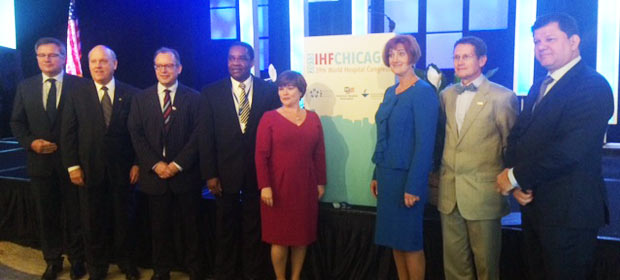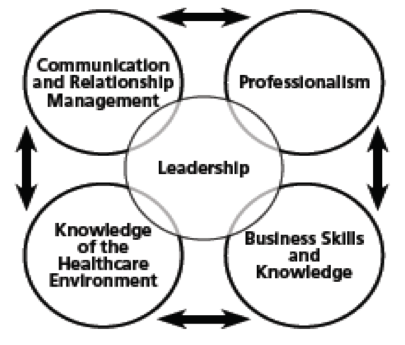In an attempt to address this leadership deficit, health management institutions have come together to raise the recognition of professional management in healthcare by developing a core competencies directory for healthcare leaders with the input of a diverse group of multilateral healthcare organisations, writes Lucy Nugent.

Leadership matters. The evidence is convincing that the efficient and effective use of resources and the quality of healthcare services provided is improved by enhancing the management capacity of individual leaders and teams.
As the healthcare portion of countries’ GDP continues to increase, the pressure for enhanced management capacity will continue to grow. Yet, healthcare organisations face two key barriers to realising the benefits of professional management. The first is the lack of adequate management preparation in the training of many healthcare leaders. The second is the fact that the role of healthcare manager is not recognised as a profession in all countries.
In an attempt to address this leadership deficit, health management institutions came together to raise the recognition of professional management in healthcare by developing a core competencies directory for healthcare leaders with the input of a diverse group of multilateral healthcare organisations. The shared aim of all participants is professionalising the leadership and management of health systems to improve patient care globally. To further promote the shared aim of enhancing leadership and management practices in healthcare, a Global Consortium for Healthcare Management that is recognised and supported by International Hospital Federation members was formed.
A Global Consortium for Healthcare Management that is recognised and supported by International Hospital Federation members was formed.
The following organisations have participated in the consortium set up by the International Hospital Federation:
- American College of Healthcare Executives
- Australasian College of Health Service Management
- Canadian College of Health Leaders
- European Association of Hospital Managers
- Federacao Brasileira de Administradores Hospitalares
- Federacion Andina y Amazonica de Hospitales
- Federacion Latinoamericana de Hospitales
- Health Management Institute of Ireland
- Hong Kong College of Healthcare Executives
- International Health Services Group
- International Hospital Federation
- Jamaican Association of Health Services
- Management Sciences for Health
- Pan American Health Organisation (PAHO)
- Taiwan College of Healthcare Managers
- Tropical Health and Education Trust – Partnership for Global Health
- University of the West Indies
The Global Consortium for Healthcare Managers formally launched the directory of Healthcare Leadership Competencies (HLC) along with a “Call to Action” at the recent International Hospital Federations 39th World congress held in Chicago, USA, October 6-8.
The directory of HLC is the result of the consortium’s extensive work between January 2013 and June 2015.
All the participant from these institutions have built up a consensus to promote the foundation of healthcare management professionalisation supported by universally recognised competencies that will enhance health care to the people. In addition more than one hundred healthcare professionals and academics have contributed in the written open review process as well as by providing inputs during the presentations made at several occasions during the period 2013 – 2015. The directory represents the core competencies for healthcare managers which countries and healthcare systems can build on to reflect the needs of each country.
The directory represents the core competencies for healthcare managers which countries and healthcare systems can build on to reflect the needs of each country.
In the Competency Directory, the competencies are categorised into five critical domains: Leadership, Communication and Relationship Management, Professional and Social Responsibility, Health and Healthcare Environment, and Business.
The Definitions of the domains are as follows:
Leadership
The ability to inspire individual and organisational excellence, create a shared vision and successfully manage change to attain an organisation’s strategic ends and successful performance. Leadership intersects with the other four domains.
Communication and Relationship Management
The ability to communicate clearly and concisely with internal and external customers, establish and maintain relationships, and facilitate constructive interactions with individuals and groups.
Professional and Social Responsibility
The ability to align personal and organisational conduct with ethical and professional standards that include a responsibility to the patient and community, a service orientation and a commitment to lifelong learning and improvement.
Health and the Healthcare Environment
The understanding of the healthcare system and the environment in which healthcare managers and providers function.
Business
The ability to apply business principles, including systems thinking, to the healthcare environment.

As well as launching the HLC directory the Consortium called for the congress attendees’ commitment in the professionalisation of healthcare management through four main areas:
- The adoption of the Leadership Competencies for Healthcare Services Managers to train and align healthcare management development at all levels of health systems.
- Formal recognition at the national level of healthcare management as a profession that requires training and the development of specific competencies.
- Implementation of merit-based career advancement along with a career path of healthcare managers.
- Recognition of healthcare managers’ professional associations as key stakeholders for policy dialogue related to leadership and management and for the advancement of the profession.
Following the HLC launch, a well-attended session with presentations by Dr Reynaldo, Pan American Health Organisation/World Health Organisation, Ray Raclette, Canadian College of Health Leaders Association and Lucy Nugent, Health Management Institute of Ireland (also representing the European Association of Hospital Managers) was followed by a lively debate moderated by Deborah J. Bowen, American College of Healthcare Executives, which looked at way of incorporating the HLC into healthcare systems which included:
- Recruitment including competency based interviews
- Continuous Professional Development
- Education and training -Review course content to reflect directory
- Professionalisation of Healthcare Managers including credentialing
For further information please contact Lucy Nugent lucy.nugent@amnch.ie
1 Management Sciences for Health “Occasional Papers” NO. 4 (2006)

